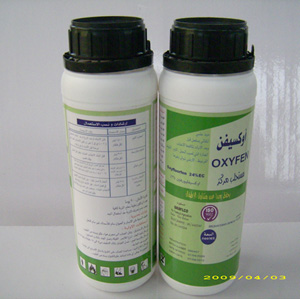Oxyfluorfen - 24%EC Specificaton & Trade Terms
| Model | 24%EC |
|---|
| Place Of Origin | china |
|---|
| Price Term | EX-Work |
|---|
| Payment Term | T/T |
|---|
Oxyfluorfen is a selective pre and postemergent herbicide used to control certain annual broadleaf and grassy weeds in vegetables, fruit, cotton, es] ornamentals and on non-crop areas. It is a contact herbicide and light is required for it to affect target plants. It is available in emulsifiable concentrate and granular formulations.
TOXICOLOGICAL EFFECTS
ACUTE TOXICITY
Oxyfluorfen is a moderately toxic by ingestion and slightly toxic by dermal absorption. Vapors may cause irritation of the nose, throat, skin and eyes, and other forms may cause irritation to skin and eyes.
The oral LD50 for technical Oxyfluorfen in rats is 5,000 mg/kg and > 5,000 mg/kg in dogs. The dermal LD50 on rabbits is > 10,000 mg/kg.
CHRONIC TOXICITY
Long-term exposure to Oxyfluorfen may cause the same symptoms as short-term exposure. Effects on the liver have been observed in long-term feeding studies with rats, mice and dogs. In a 2-year feeding study with dogs, the NOEL was 100 ppm (2.5 mg/kg/day).
PHYSICAL PROPERTIES AND GUIDELINES
Oxyfluorfen is a white to orange or red-brown crystalline solid with a smoke-like odor. It may decompose if exposed to UV light.
Oxyfluorfen is stable under normal temperatures and pressures, but poses a slight fire hazard if exposed to heat or flame, and a fire and explosion hazard in the presence of strong oxidizers. It may burn but will not readily ignite. It may form flammable or explosive dust-air mixtures. Avoid contact with strong oxidizers, excessive heat, sparks or open flame. Thermal decomposition may release highly toxic fumes of fluorides and chlorides and toxic oxides of nitrogen and carbon. Workers handling Oxyfluorfen should wear goggles to prevent eye contact with this chemical and protective clothing to prevent prolonged skin contact.
